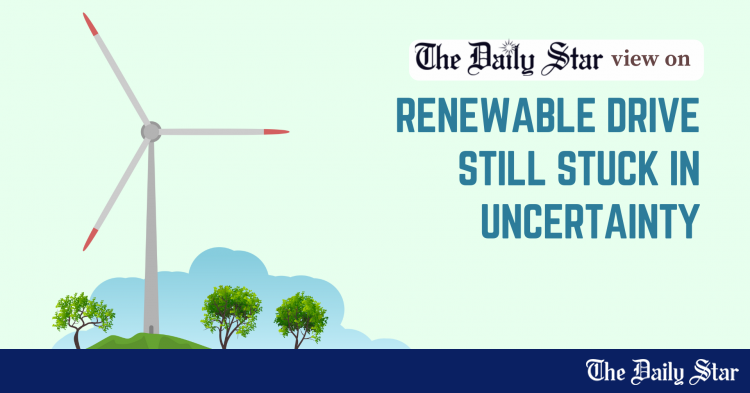Saif
Senior Member
- Joined
- Jan 24, 2024
- Messages
- 16,880
- Likes
- 8,153
- Nation

- Residence

- Axis Group


BIPPA warns of potential power disruptions in summer amid unpaid dues
The Bangladesh Independent Power Producers’ Association, or BIPPA, has called on the government to pay outstanding dues to private power plants, warning of severe electricity shortages in the upcoming summer if immediate action is not taken. KM Rezaul Hasanat, the newly elected president of
BIPPA warns of potential power disruptions in summer amid unpaid dues
Published :
Jan 24, 2025 00:10
Updated :
Jan 24, 2025 00:10

The Bangladesh Independent Power Producers’ Association, or BIPPA, has called on the government to pay outstanding dues to private power plants, warning of severe electricity shortages in the upcoming summer if immediate action is not taken.
KM Rezaul Hasanat, the newly elected president of BIPPA, urged swift action during a discussion with journalists at the Sonargaon Hotel in Dhaka on Thursday, reports bdnes24.com.
In a brief presentation, former BIPPA president Imran Karim, disclosed that private power producers are owed Tk 160 billion in arrears over the past four months. He noted that a significant portion of the debt—more than Tk 100 billion of this amount is owed to liquid fuel-based plants.
The power plants have faced prolonged arrears with the government since the onset of the Covid-19 pandemic in 2020. Despite contracts stipulating a maximum payment delay of 30 days, the Power Development Board, or PDB, has reportedly been defaulting on payments for 120 to 180 days, with delays extending to as long as 200 days in some cases.
During this protracted period of arrears, the BIPPA claimed to have suffered substantial financial setbacks. The association reported a loss of Tk 55 billion due to the depreciation of the taka against the dollar, alongside an additional loss of Tk 32 billion in interest on working capital.
Imran emphasised the urgency of opening letters of credit, or LCs, immediately to ensure the operation of oil-based power plants in the upcoming summer.
He noted that any delay in this process could jeopardise the country's power supply during the peak demand season.
“If the LC is opened today, the oil will reach the plants after 45 days,” he explained, underscoring the tight timeline.
“It is not possible for the companies to open LCs if the dues are not received,” he added.
Currently, Bangladesh is generating between 9,000 and 10,000 megawatts (MW) of electricity, with only 400 to 600 MW coming from liquid fuel-based power plants. However, as the summer season approaches, the demand from this sector is expected to surge, requiring at least 4,000 MW of electricity to be supplied from these plants.
Speakers at the event warned that the summer season could begin as early as March, underscoring the need for immediate action. They stressed that initiatives must be taken now to ensure liquid fuel-based power plants are fully operational in time to meet the increased demand.
“We have met with the government three times since December to convey our concerns,” Hasanat said.
“Now, I am informing journalists so the public understands the challenges we face and no blame is misplaced later.”
Published :
Jan 24, 2025 00:10
Updated :
Jan 24, 2025 00:10
The Bangladesh Independent Power Producers’ Association, or BIPPA, has called on the government to pay outstanding dues to private power plants, warning of severe electricity shortages in the upcoming summer if immediate action is not taken.
KM Rezaul Hasanat, the newly elected president of BIPPA, urged swift action during a discussion with journalists at the Sonargaon Hotel in Dhaka on Thursday, reports bdnes24.com.
In a brief presentation, former BIPPA president Imran Karim, disclosed that private power producers are owed Tk 160 billion in arrears over the past four months. He noted that a significant portion of the debt—more than Tk 100 billion of this amount is owed to liquid fuel-based plants.
The power plants have faced prolonged arrears with the government since the onset of the Covid-19 pandemic in 2020. Despite contracts stipulating a maximum payment delay of 30 days, the Power Development Board, or PDB, has reportedly been defaulting on payments for 120 to 180 days, with delays extending to as long as 200 days in some cases.
During this protracted period of arrears, the BIPPA claimed to have suffered substantial financial setbacks. The association reported a loss of Tk 55 billion due to the depreciation of the taka against the dollar, alongside an additional loss of Tk 32 billion in interest on working capital.
Imran emphasised the urgency of opening letters of credit, or LCs, immediately to ensure the operation of oil-based power plants in the upcoming summer.
He noted that any delay in this process could jeopardise the country's power supply during the peak demand season.
“If the LC is opened today, the oil will reach the plants after 45 days,” he explained, underscoring the tight timeline.
“It is not possible for the companies to open LCs if the dues are not received,” he added.
Currently, Bangladesh is generating between 9,000 and 10,000 megawatts (MW) of electricity, with only 400 to 600 MW coming from liquid fuel-based power plants. However, as the summer season approaches, the demand from this sector is expected to surge, requiring at least 4,000 MW of electricity to be supplied from these plants.
Speakers at the event warned that the summer season could begin as early as March, underscoring the need for immediate action. They stressed that initiatives must be taken now to ensure liquid fuel-based power plants are fully operational in time to meet the increased demand.
“We have met with the government three times since December to convey our concerns,” Hasanat said.
“Now, I am informing journalists so the public understands the challenges we face and no blame is misplaced later.”



